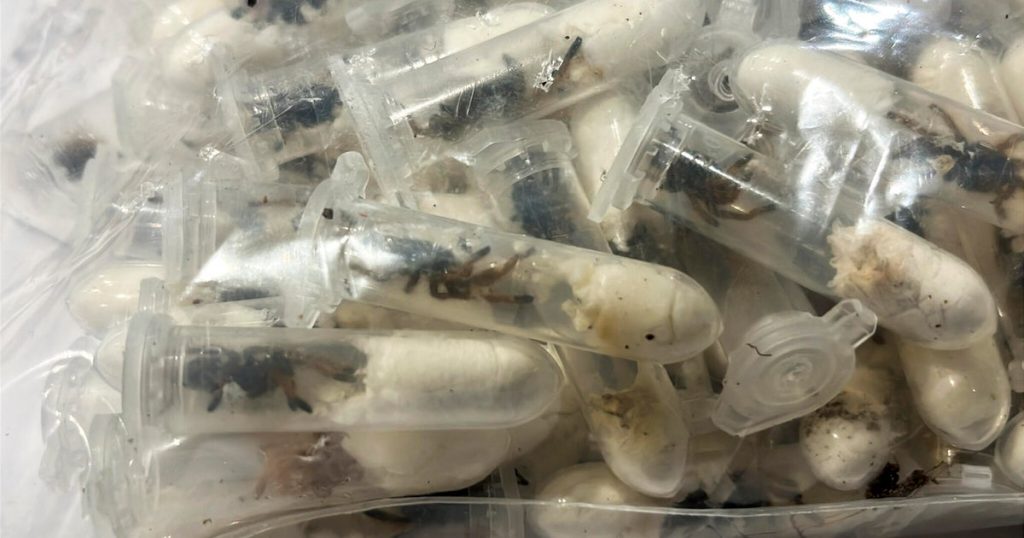In a shocking incident at Cologne Bonn Airport in Germany, customs officials discovered around 1,500 young tarantulas hidden inside chocolate sponge cake boxes. The discovery was made three weeks ago but was reported recently after customs officials were alerted by an unusual smell emanating from the packages. The young spiders had traveled from Vietnam, and most sadly did not survive the journey. Investigations are now underway into the violations surrounding this unusual shipment.
| Article Subheadings |
|---|
| 1) Unprecedented Find at Cologne Bonn Airport |
| 2) Smell Leads to Discovery |
| 3) Tarantula Shipment Details |
| 4) Animal Welfare Concerns |
| 5) Ongoing Investigation and Legal Proceedings |
Unprecedented Find at Cologne Bonn Airport
The recent discovery of approximately 1,500 young tarantulas at Cologne Bonn Airport has drawn significant attention. Custom officials were taken aback by the sheer volume of tarantulas found concealed within what appeared to be an innocuous shipment of chocolate sponge cake boxes. According to Jens Ahland, a spokesperson for the Cologne customs office, this incident has left even the most seasoned officials dumbfounded. Such a substantial find is quite rare, highlighting the extreme lengths to which individuals may go to engage in illicit activities involving wildlife trafficking.
Smell Leads to Discovery
The spiders were discovered after customs officials noticed an “unusual odor” coming from a package that did not match the sweet scent of the chocolate it purportedly contained. It was this unusual smell that prompted a closer inspection of the shipment. Following this, officials found several plastic containers filled with the young tarantulas. This incident serves as a testament to the rigorous inspection processes in place at major airports, underscoring the role of alert customs officials in safeguarding wildlife.
Tarantula Shipment Details
The shipment originated from Vietnam and had been intended for an unknown recipient in Germany. The container holding the tarantulas was poorly designed for transporting live creatures and did not adhere to any known welfare guidelines. Reports indicate that most of the tarantulas in the shipment did not survive the harsh conditions of their transport. The surviving spiders have been handed over to an expert handler for proper care, demonstrating a commitment to ensuring their welfare despite the shocking initial circumstances surrounding their journey.
Animal Welfare Concerns
This incident raises serious concerns regarding animal welfare laws in Germany, as well as the ethical considerations inherent in wildlife trade. According to officials, the shipment of tarantulas represents a clear violation of German animal welfare standards, emphasizing the need for stricter regulations surrounding the transportation and trade of living creatures. Public sentiment has expressed dismay over the inhumane treatment of the tarantulas and a desire for harsher penalties against those engaged in wildlife trafficking.
Ongoing Investigation and Legal Proceedings
Criminal proceedings are presently underway against the intended recipient of the tarantula shipment. Allegations include failure to pay the correct import duties and improper customs declarations. As investigations continue, it remains uncertain how the legal system will address this alarming case. Officials underscore that such violations not only jeopardize wildlife but also pose risks to the environment and public health. Each aspect of this case raises questions about the efficacy of current regulations and the responsibility of individuals and organizations in wildlife trading.
| No. | Key Points |
|---|---|
| 1 | Around 1,500 young tarantulas were discovered at Cologne Bonn Airport. |
| 2 | Customs officials were alerted by an unusual smell from the packaging. |
| 3 | The shipment originated from Vietnam and was misdeclared. |
| 4 | Most of the tarantulas did not survive, raising animal welfare concerns. |
| 5 | Criminal investigations are ongoing regarding customs violations. |
Summary
The recent seizure of 1,500 young tarantulas at Cologne Bonn Airport underscores the ongoing challenges of wildlife trafficking and illegal trade. The incident not only draws attention to the need for stricter enforcement of animal welfare laws but also raises critical questions about the ethics of wildlife commerce. As authorities investigate the intended recipient and the circumstances surrounding this unusual shipment, it highlights the importance of vigilance at customs checkpoints, especially in the face of such extreme violations of regulations.
Frequently Asked Questions
Question: What are the primary concerns related to this incident?
Primary concerns include violations of animal welfare laws, the ethical implications of wildlife trafficking, and public health risks associated with improperly handled live animals.
Question: What happens to the surviving tarantulas?
The surviving tarantulas have been placed under the care of an expert handler who will ensure their proper rehabilitation and welfare following their harrowing transport.
Question: What legal actions are being considered against the recipient?
Criminal proceedings are underway, focusing on violations related to customs declarations and failure to pay appropriate import duties, alongside potential charges pertaining to animal welfare violations.


